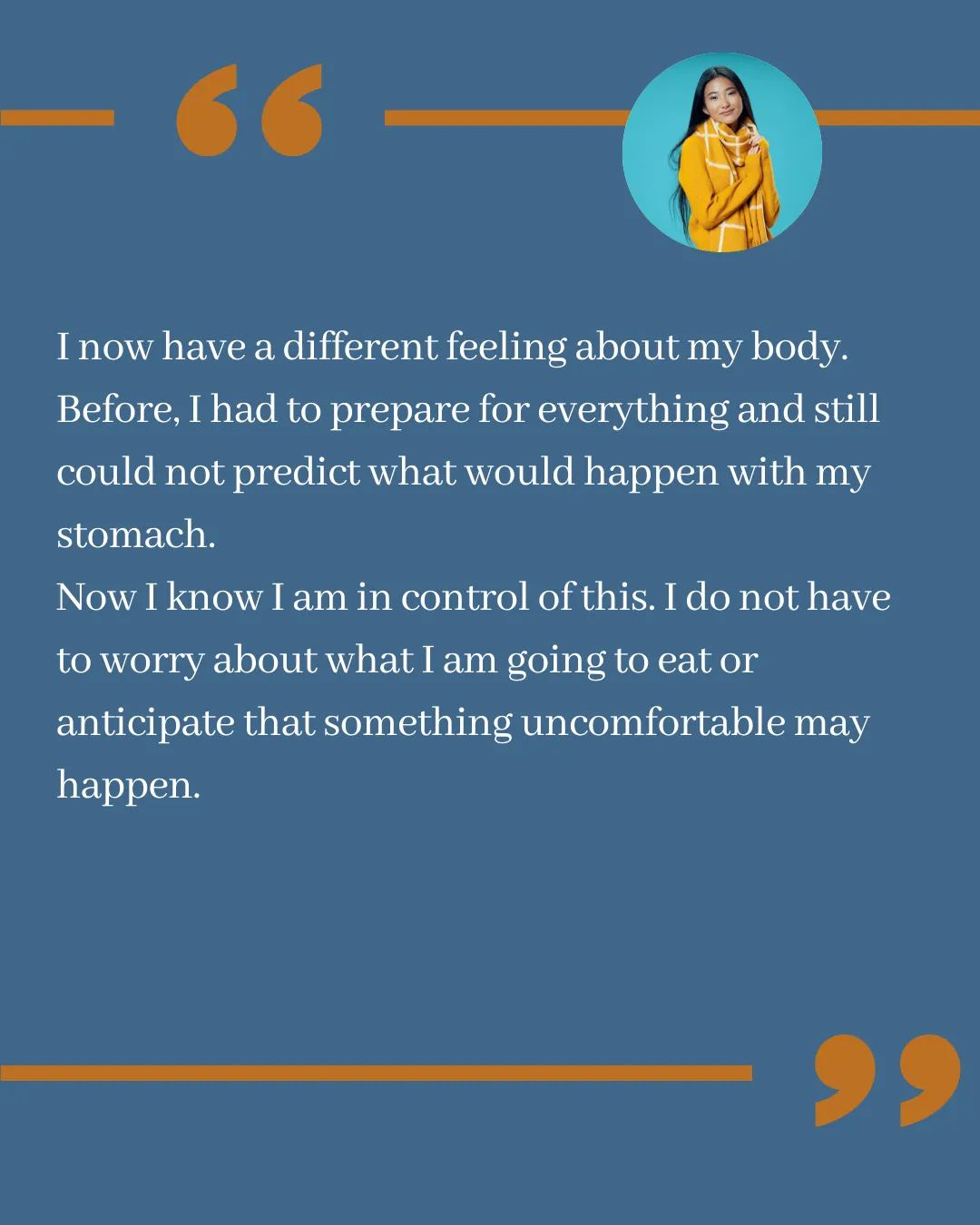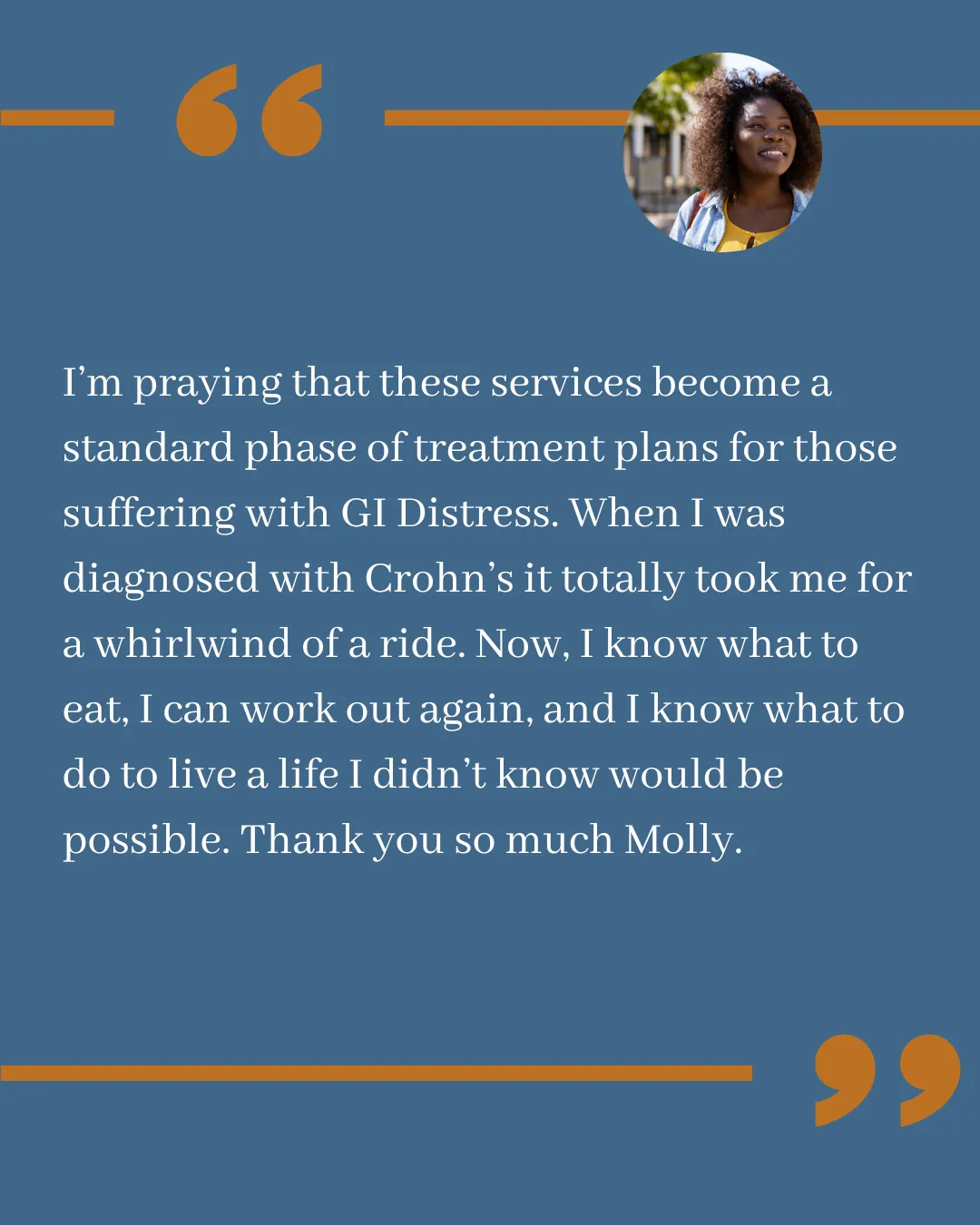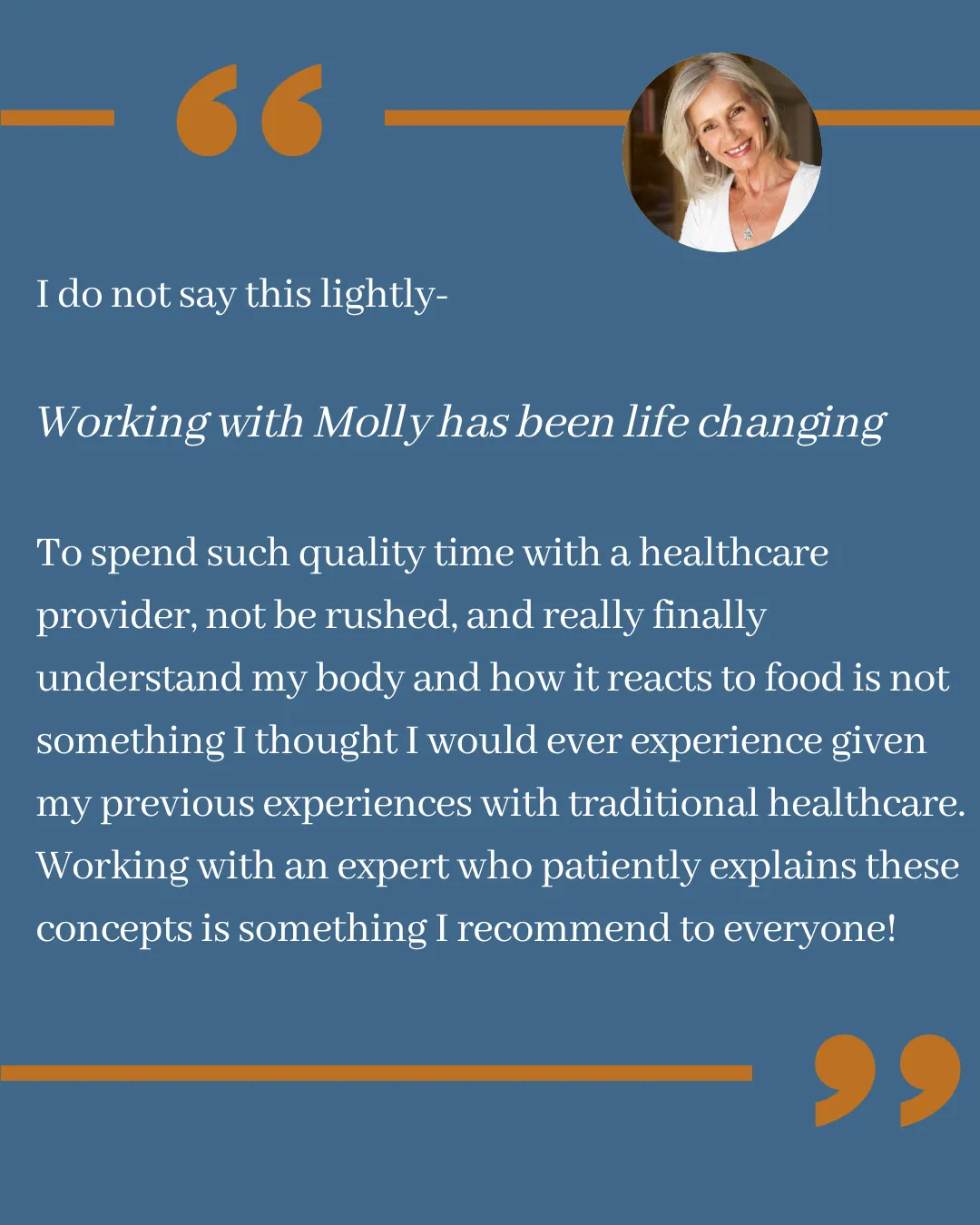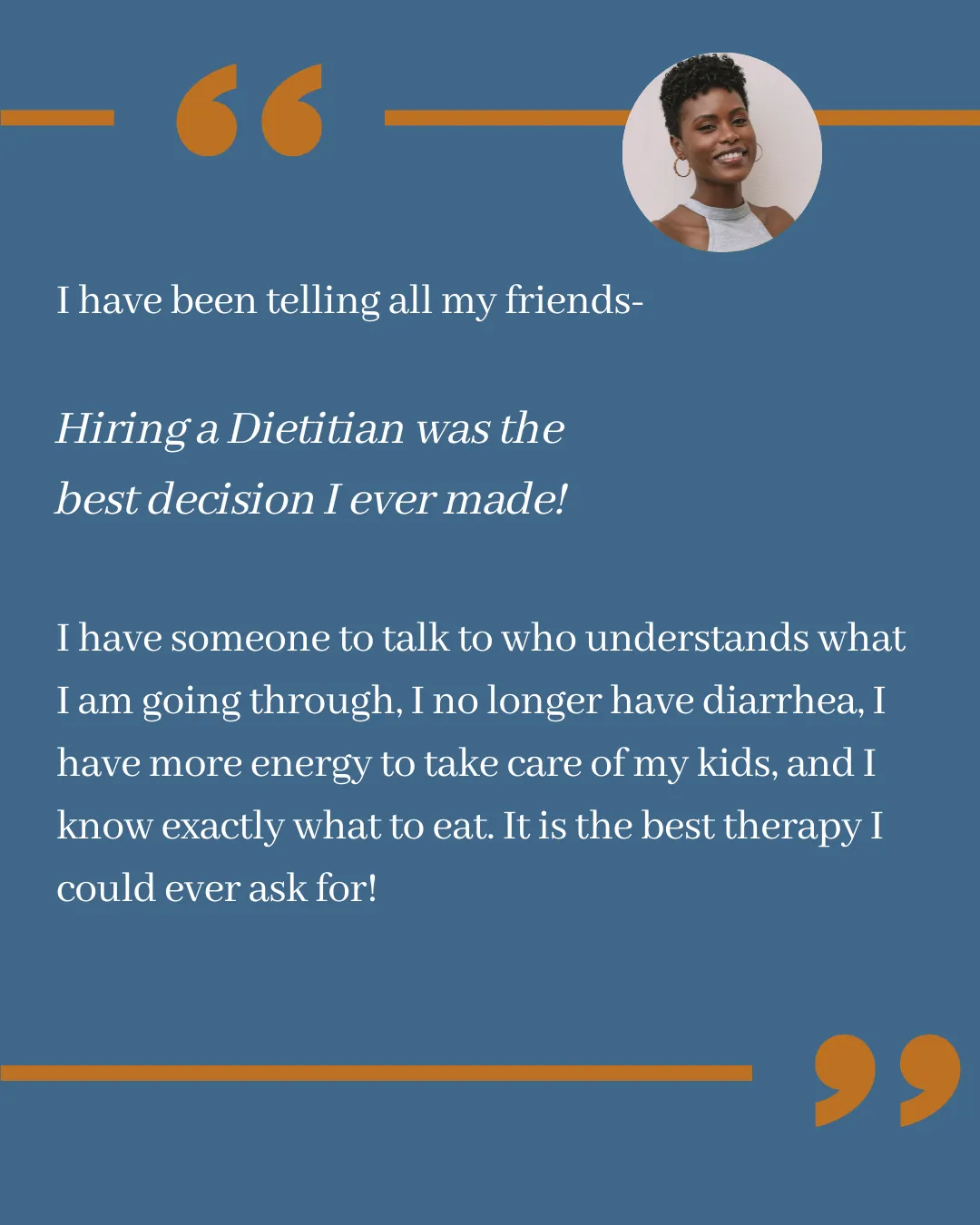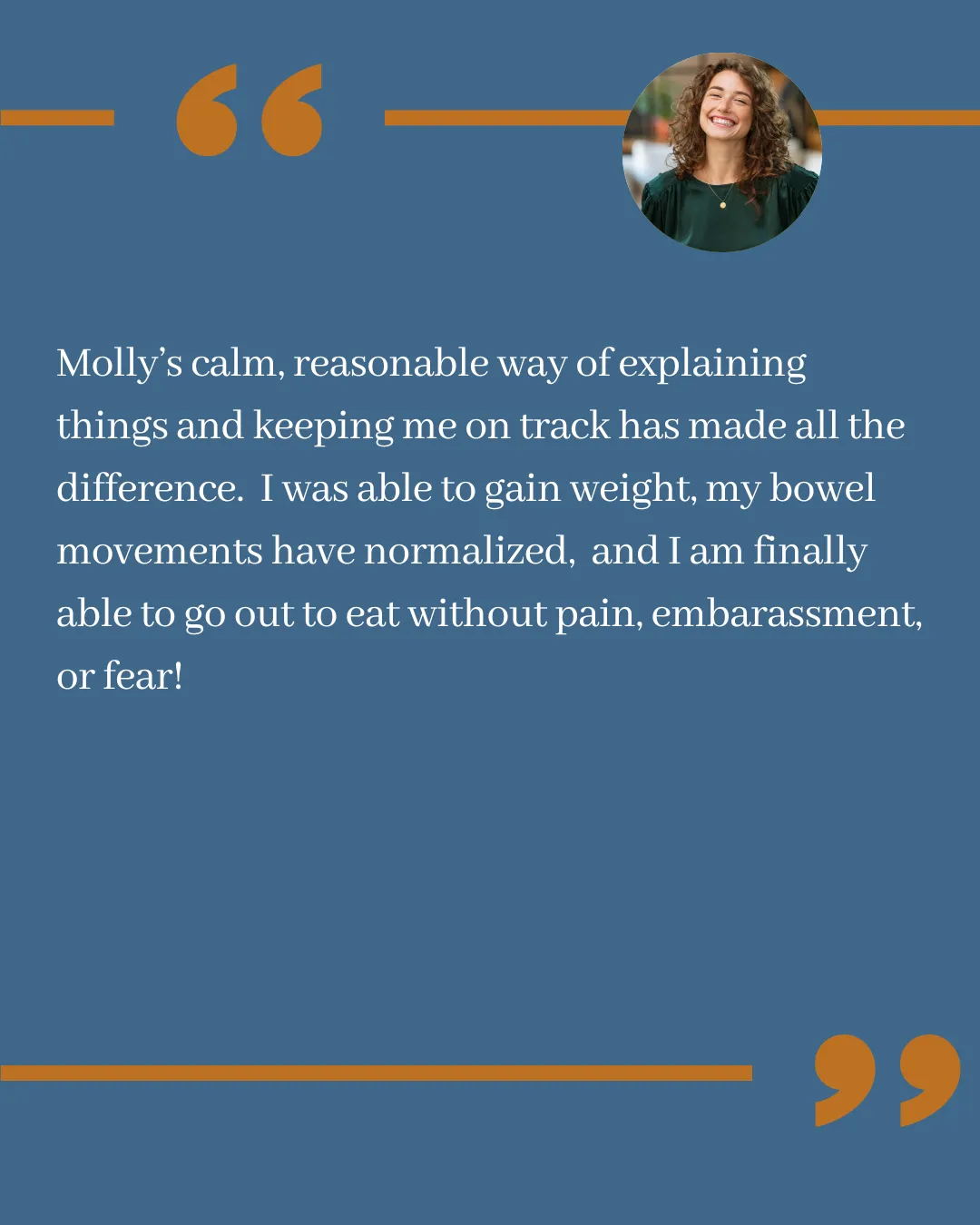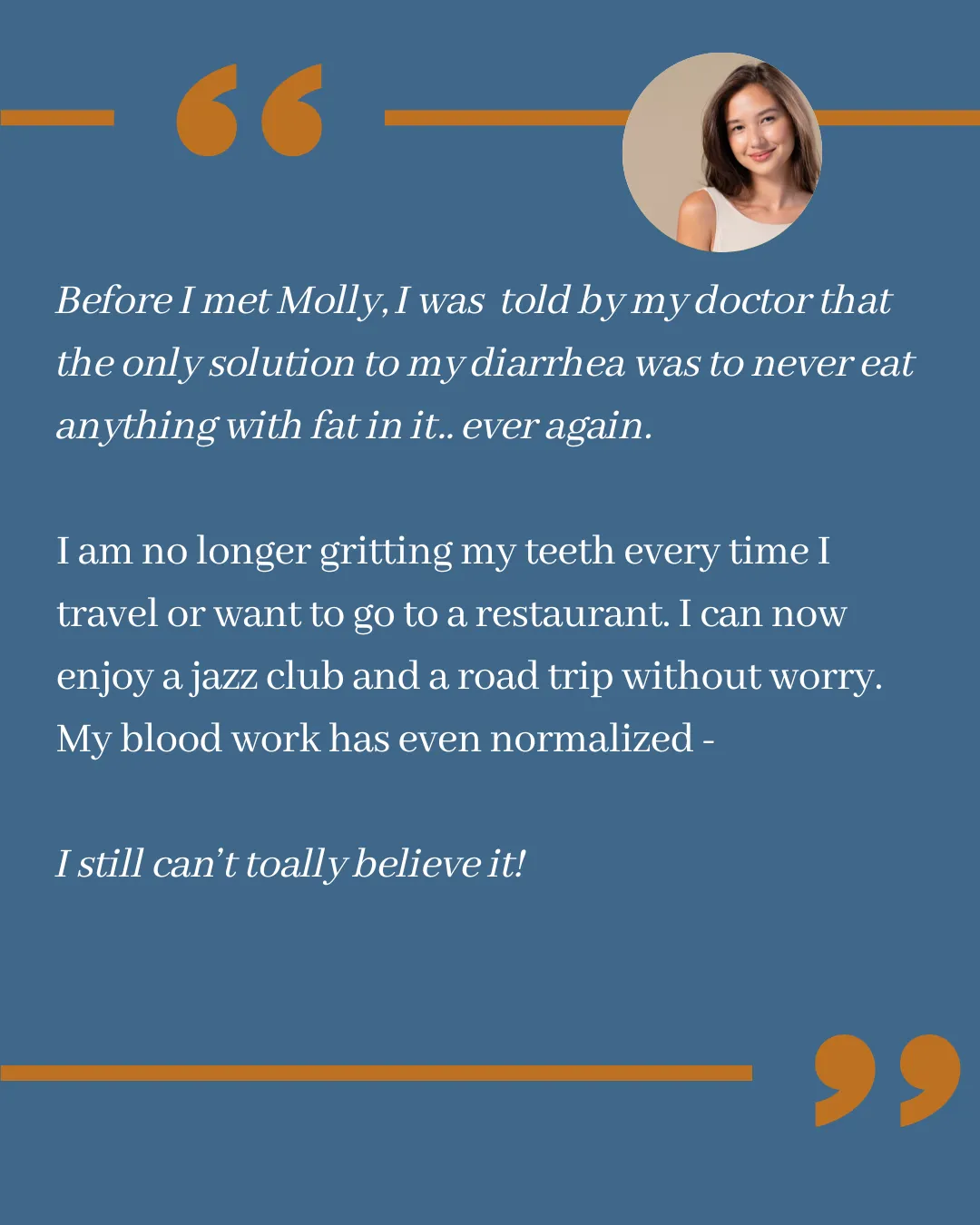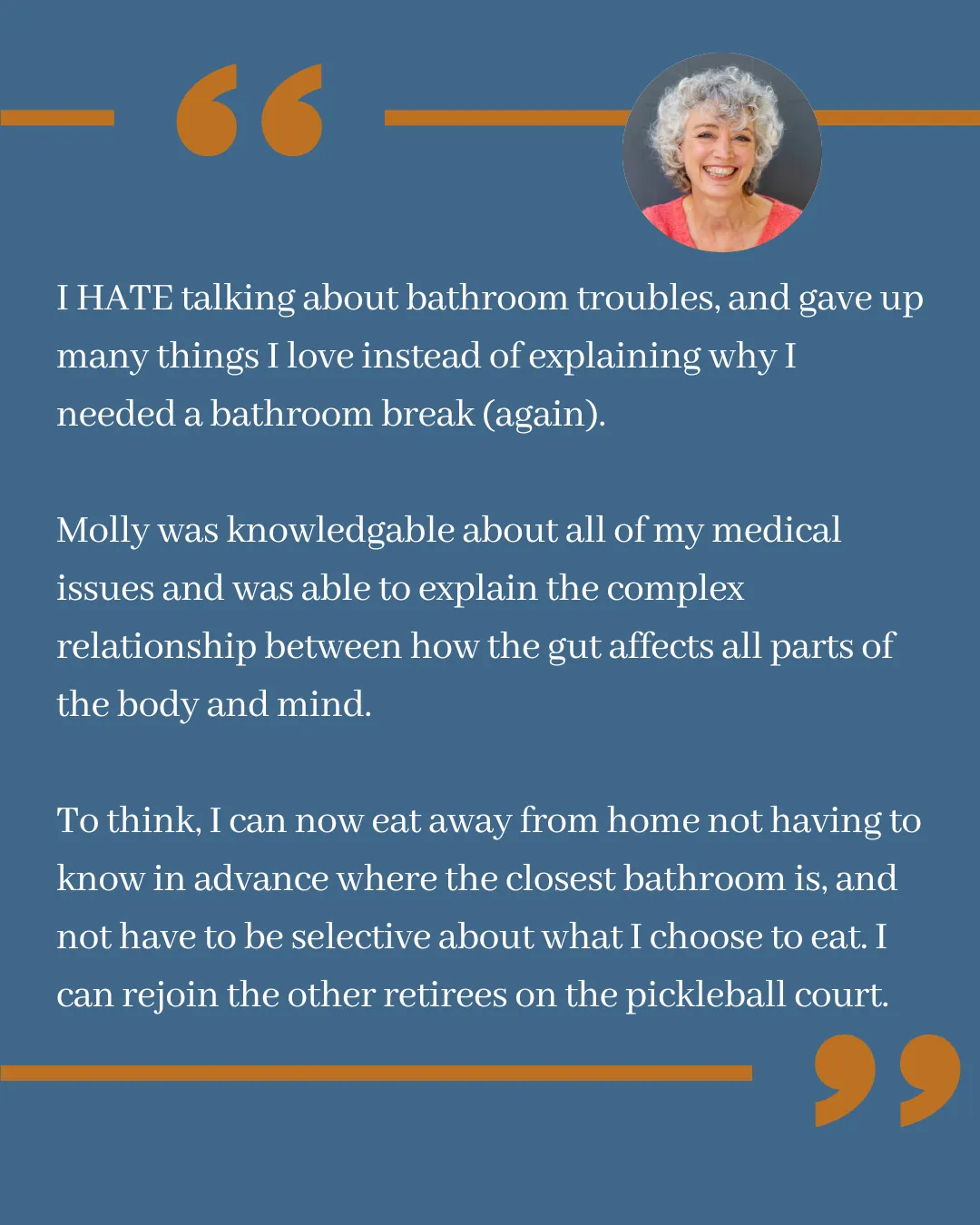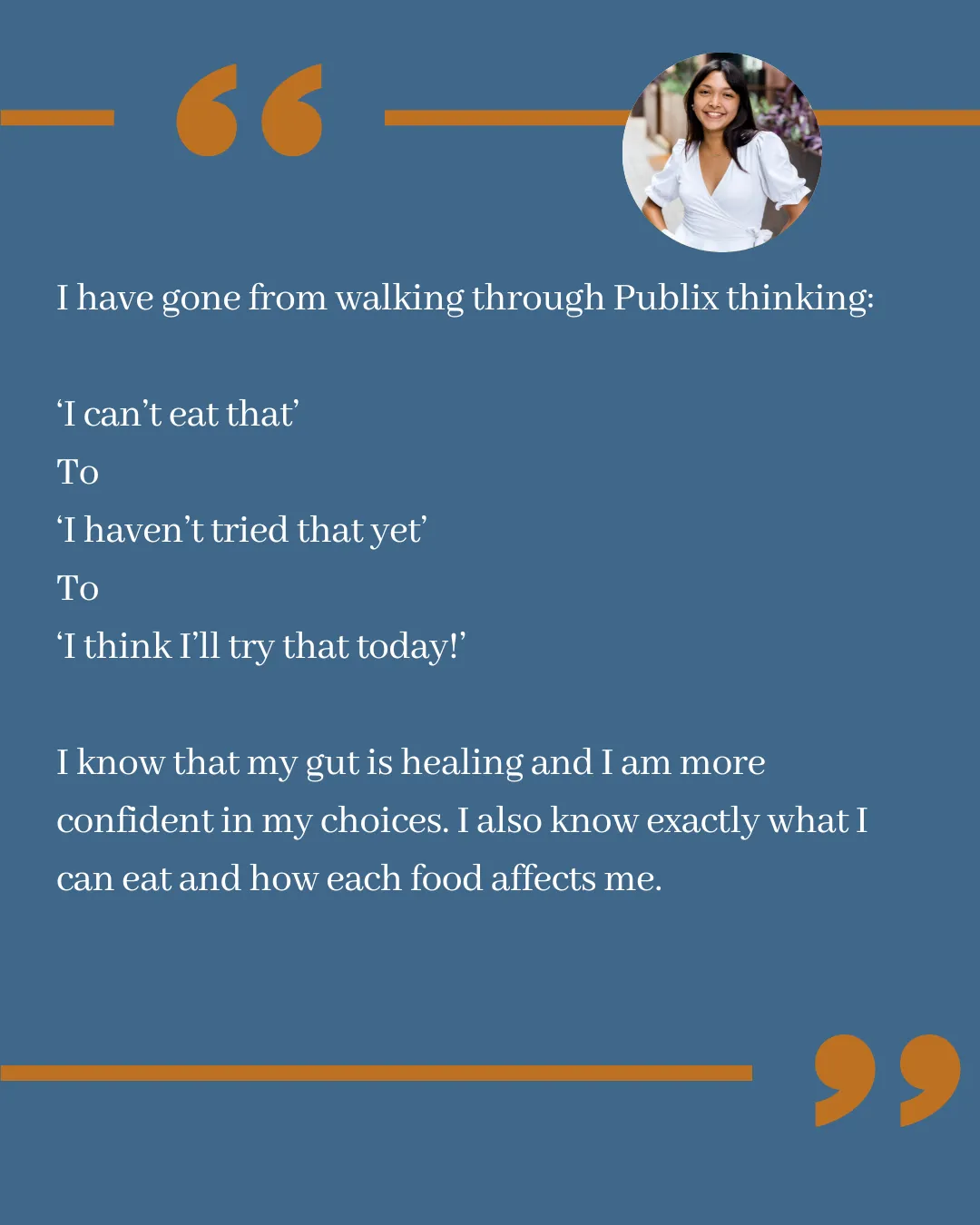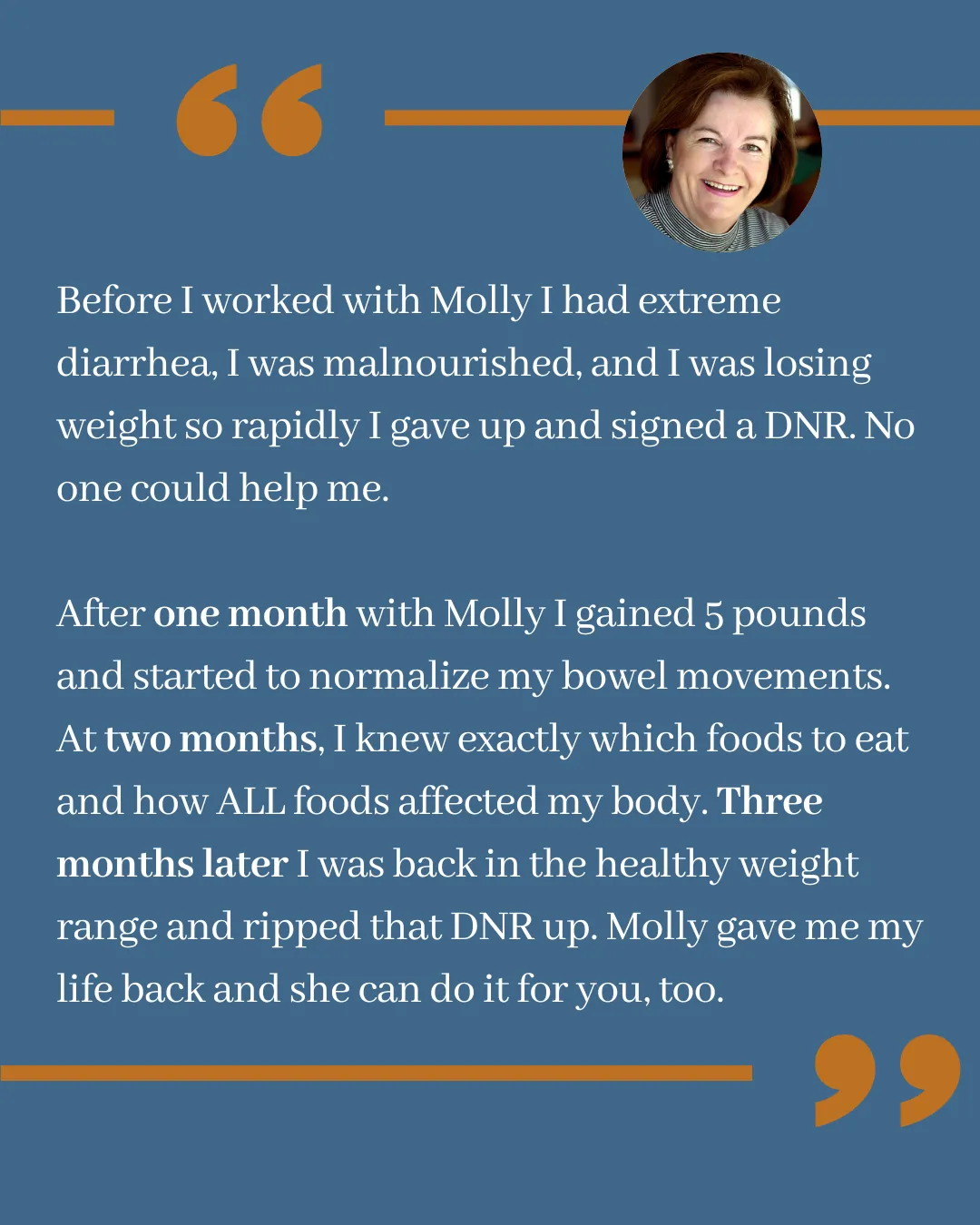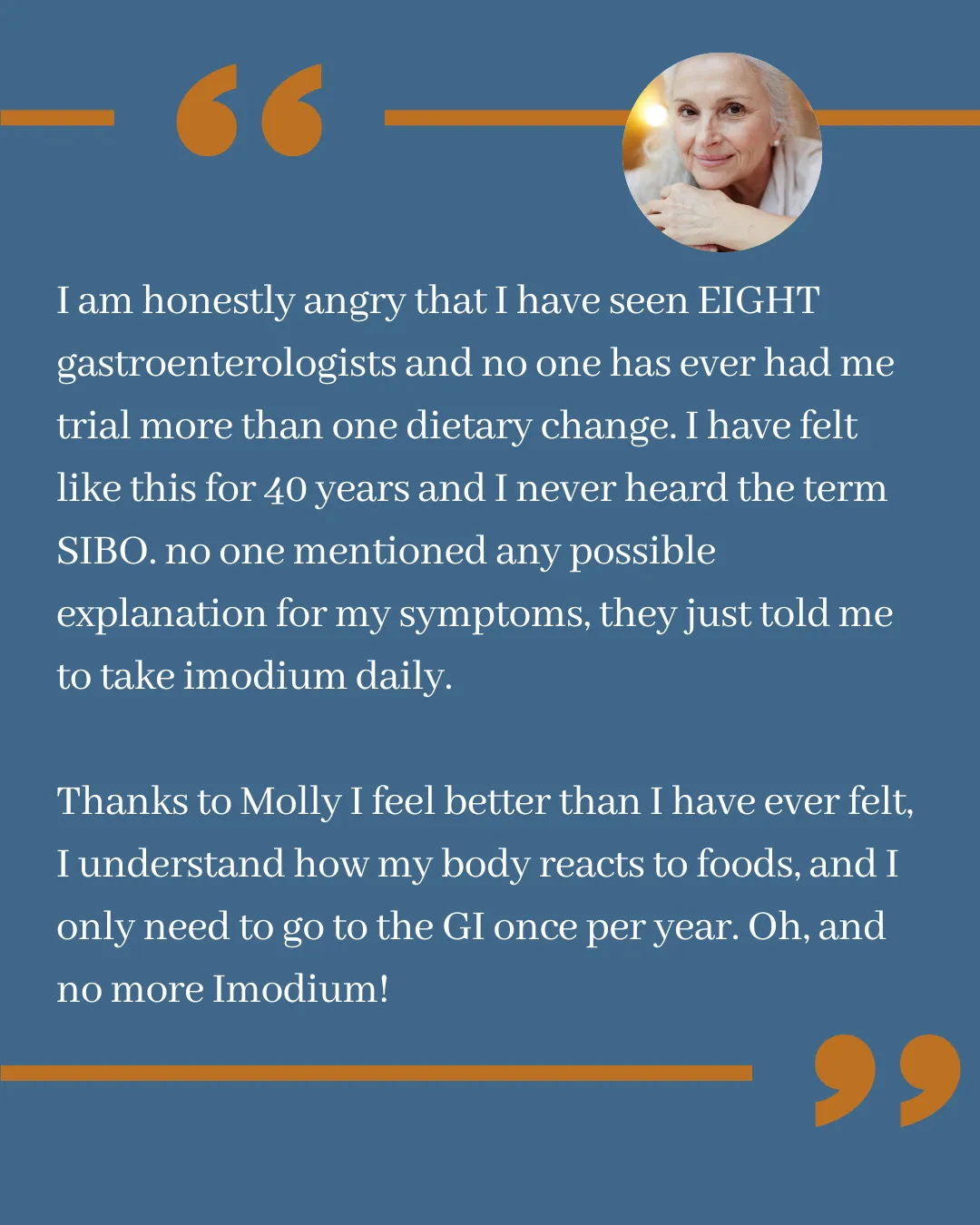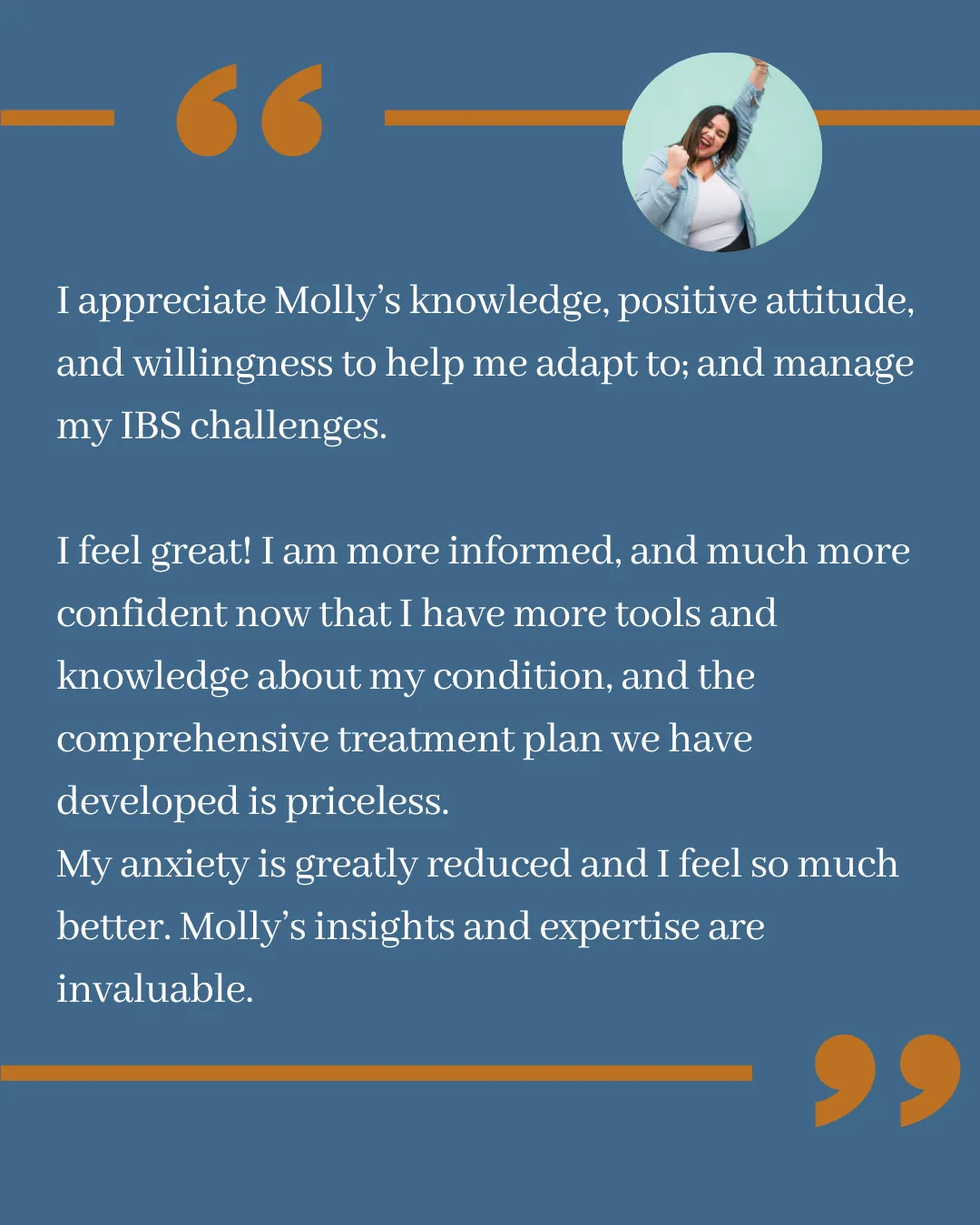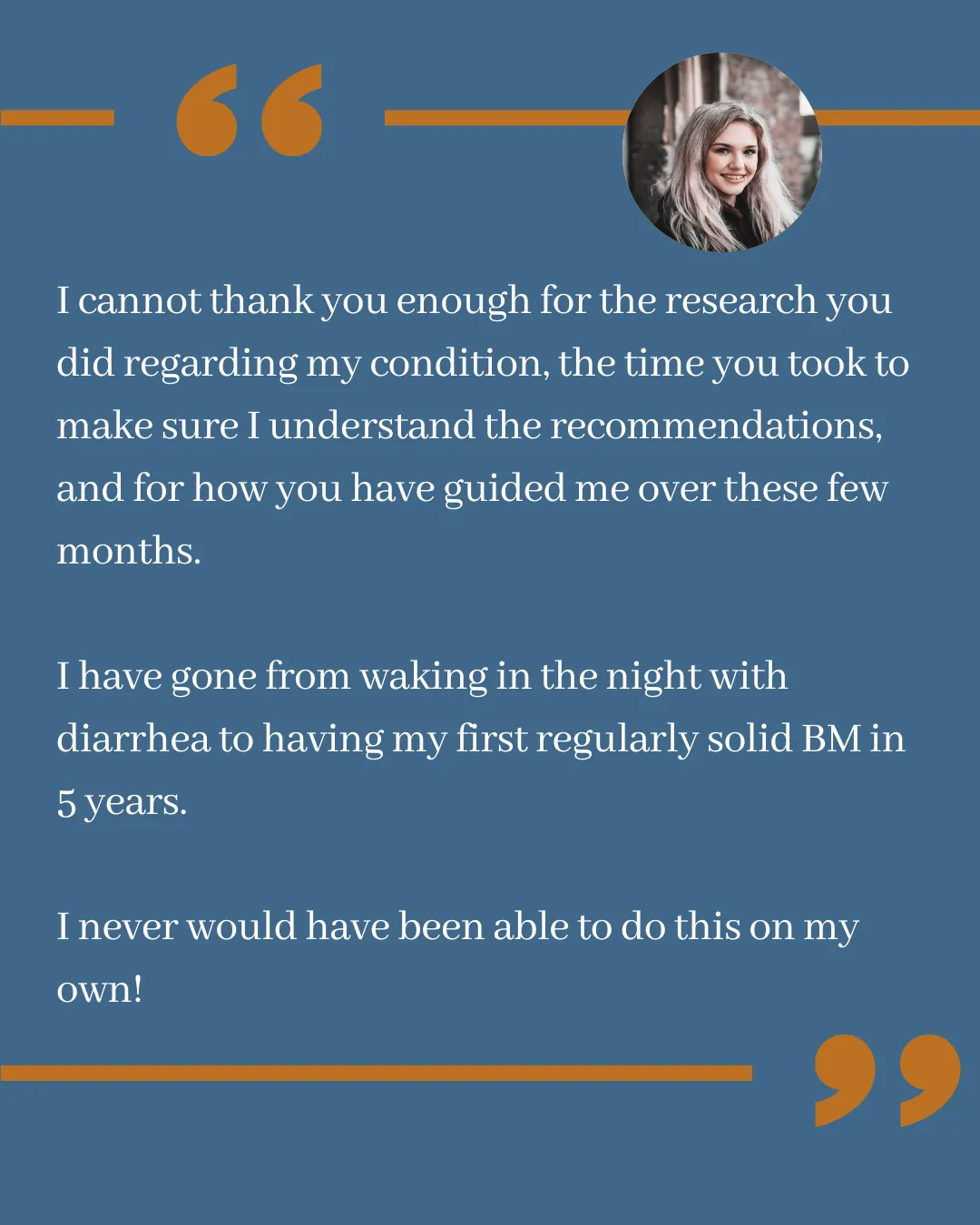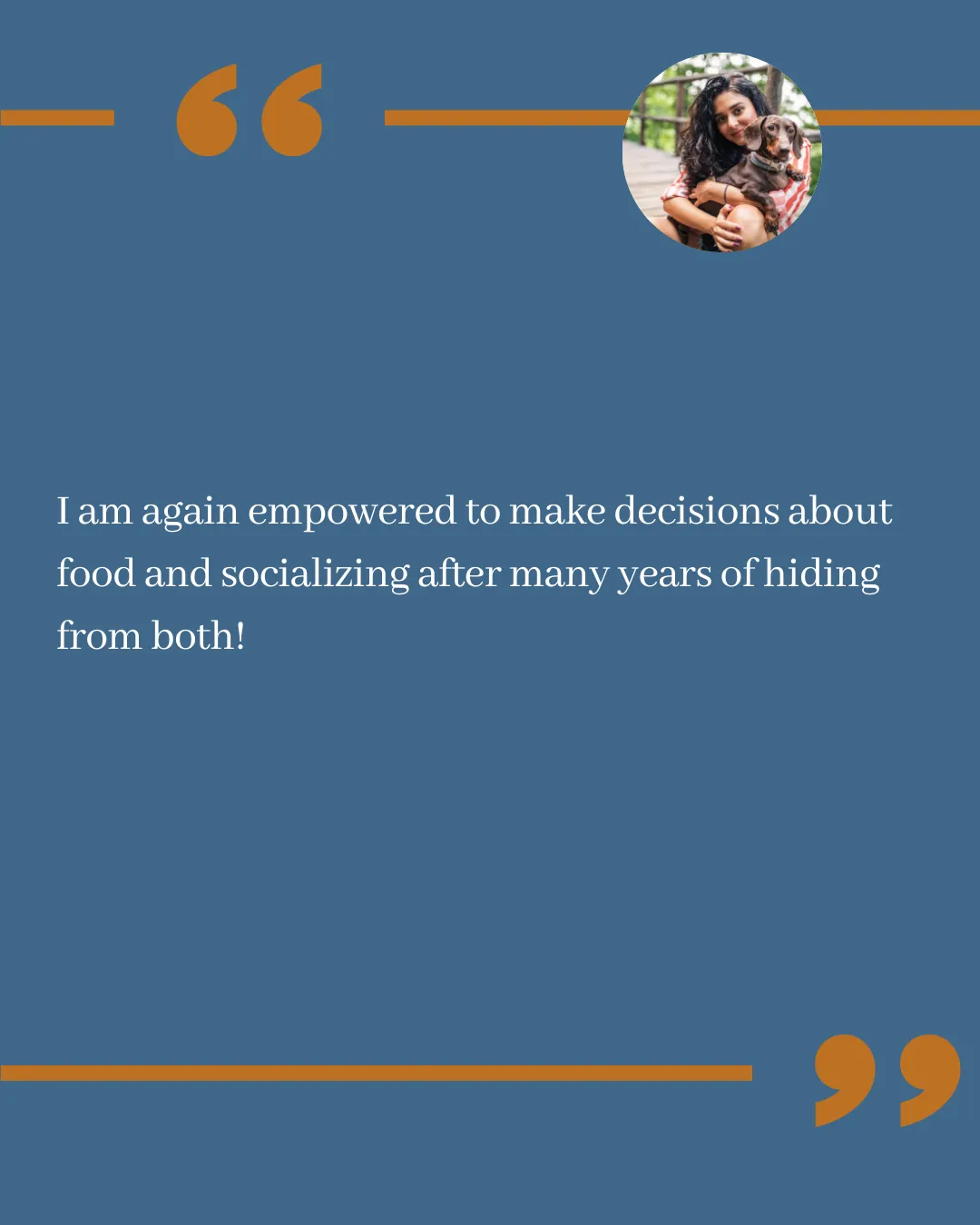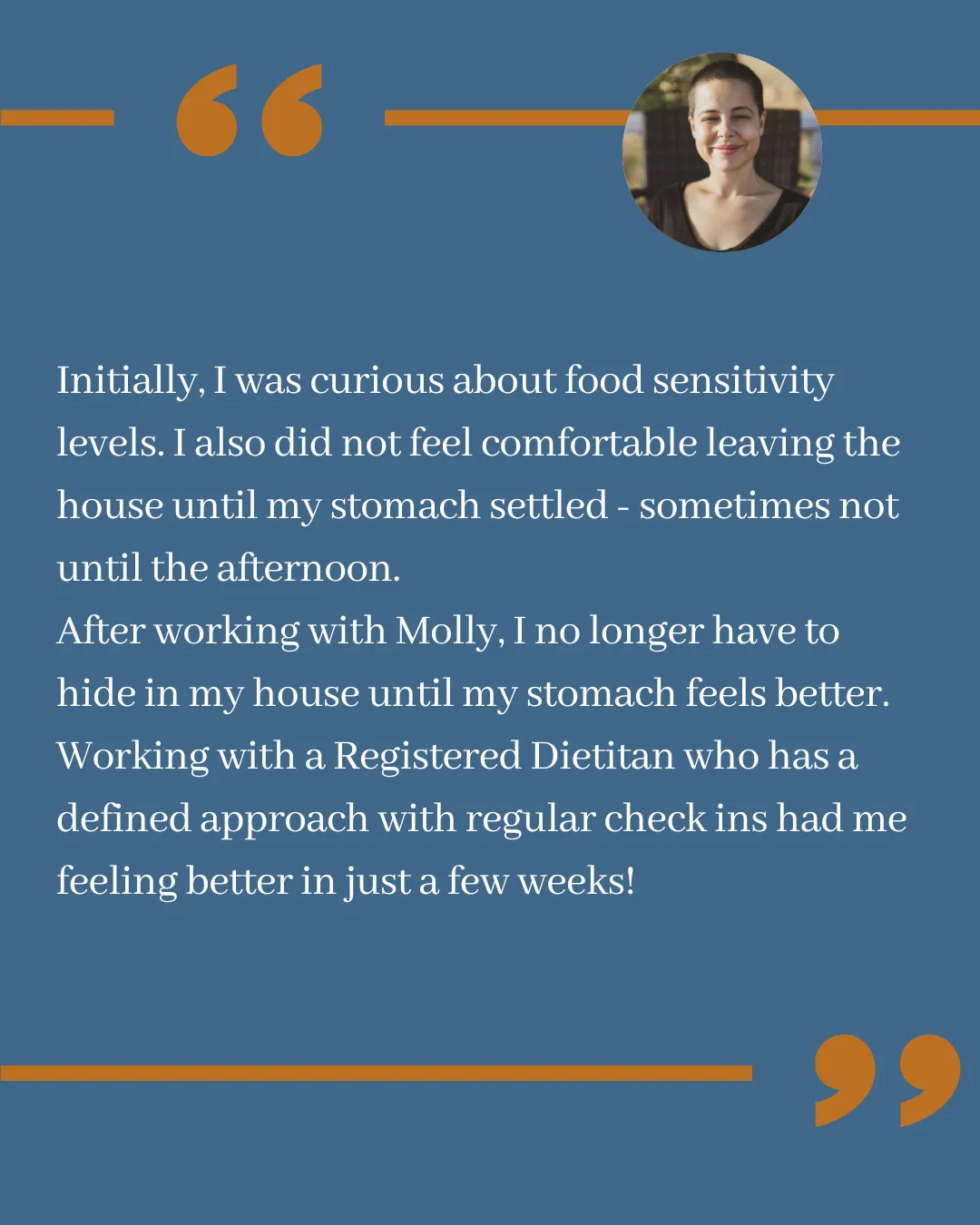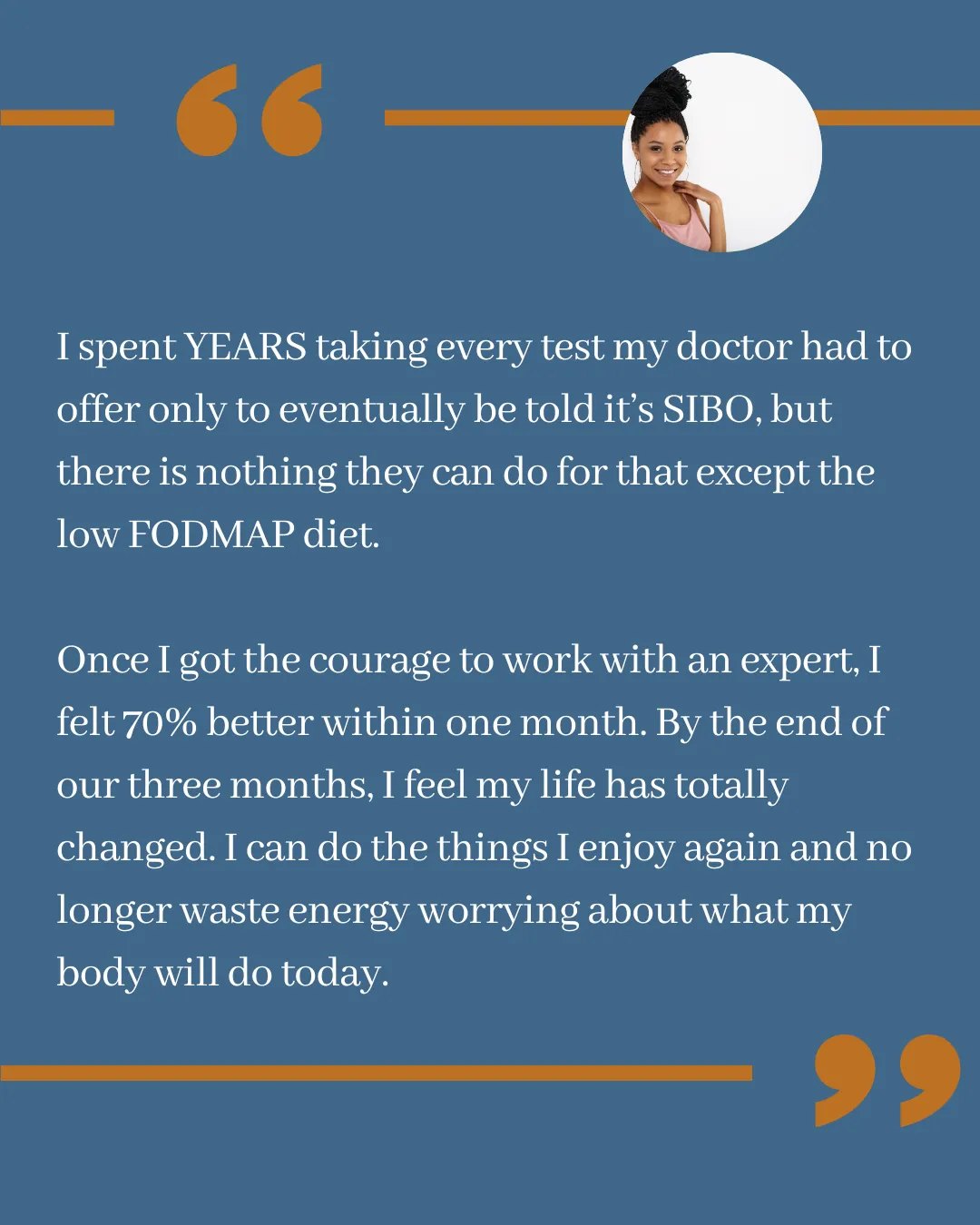Fearlessly Enjoy
Food Again
No more stomach issues, bloating, or exhaustion—get real answers and a step-by-step strategy to heal your gut, support your hormones, restore your health and reclaim your joy.
Fearlessly Enjoy
Food Again
1:1 nutrition therapy, group support, and self-paced courses to identify your symptom triggers, rebalance your gut, and get your life back.
Your body has a story to tell.
It just needs someone to listen.
The WOMEN'S GUT HEALTH method
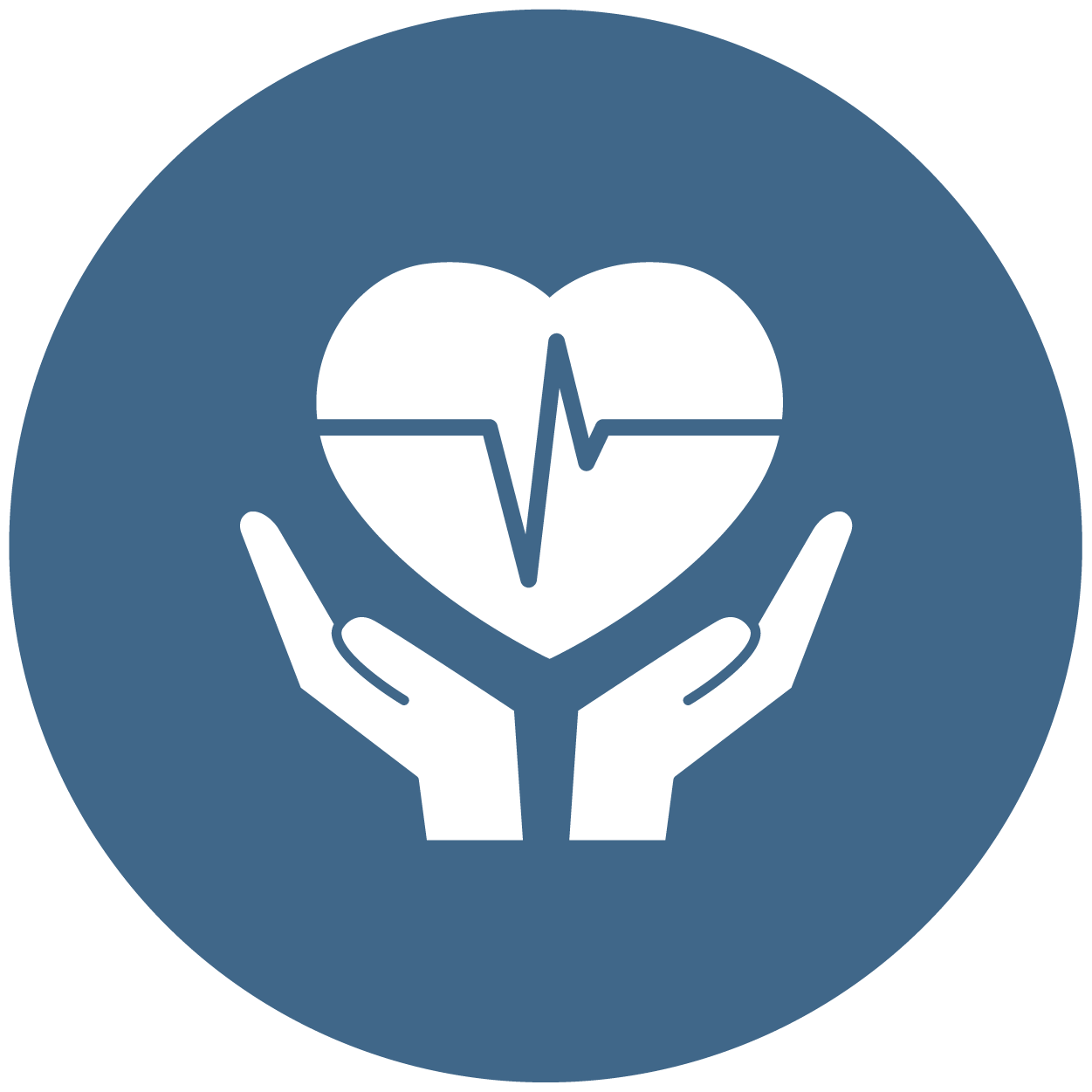
Step 1:
First we dive into your complete health history, truly listen to your body, and piece together the clues to uncover the root cause of your gut issues.
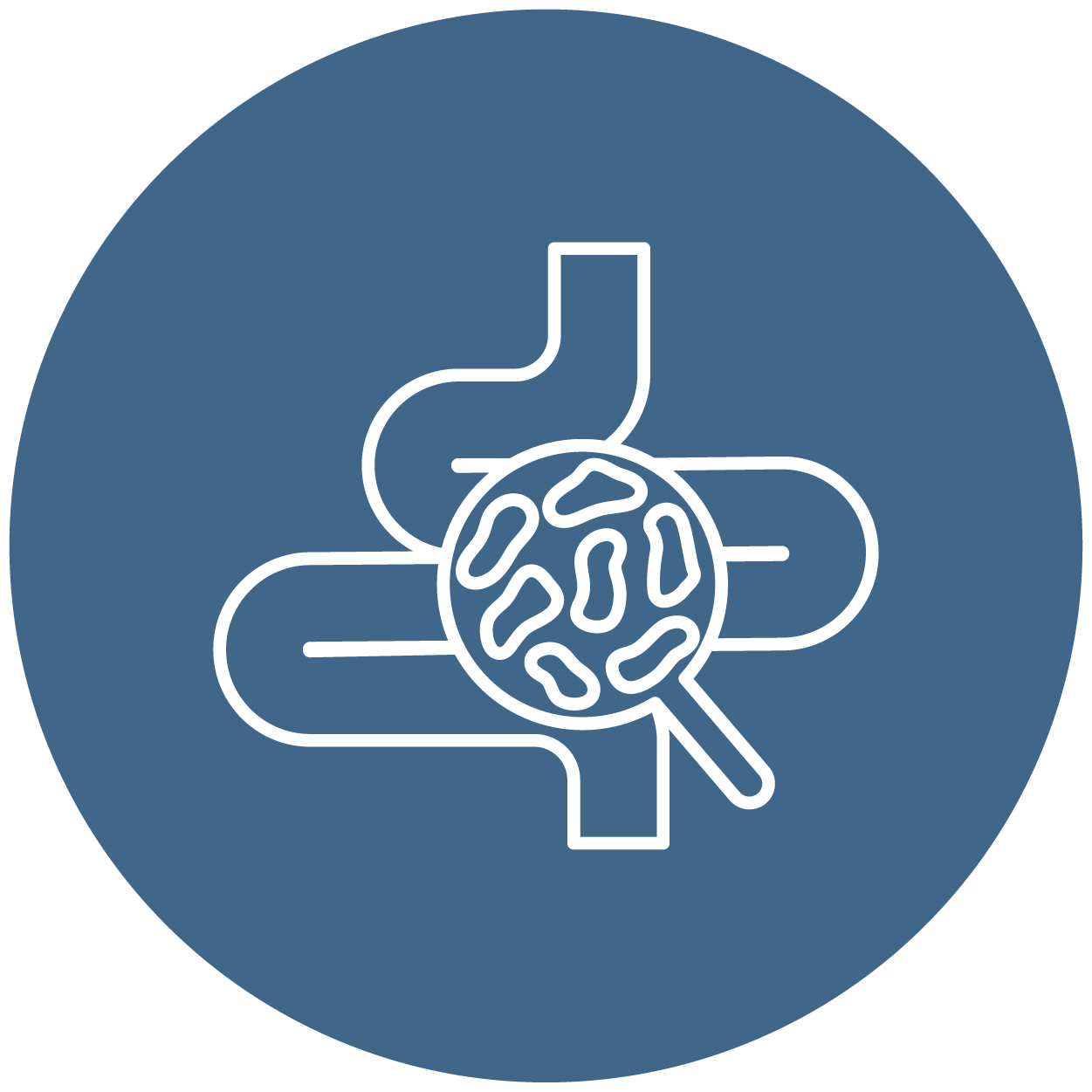
Step 2:
Tweak your current diet based on your symptoms and rebalance your gut microbiome using food and a few supplements.

Step 3:
Together, we’ll craft a simple, personalized nutrition and lifestyle plan that fits your life, schedule, and food preferences. You do NOT need to be a "wellness girlie" to get well.

Step 4:
We’ll help you continue to set easy-to-reach goals and give you the support you need to achieve them, step by step.

Transform your health and feel like yourself again:
Wake up without bloating, exhaustion, or anxiety over what to eat. With a personalized, step-by-step plan built for your body, you’ll finally have the clarity and confidence to heal from the root—without fear, frustration, or restriction. This isn’t just about fixing your digestion; it’s about reclaiming your energy, your freedom, and your life.

20k+Courses

20k+Happy Clients

500+Experts
Generic Diet Handouts Trashed
Foods Eaten Without Fear
Mystery Symptoms Solved
Women Served

About Molly Ostrander
DIETITIAN AND CERTIFIED FUNCTIONAL PRACTITIONER
I’m here to guide you from unexplained symptoms to a better quality of life. Having lived with Crohn’s disease for over 20 years, I understand what you’re going through, because I have been there. If you’re tired of being dismissed by providers who can’t help, seeking practical dietary guidance, and are ready to take control of your GI & hormone health, I’m here to support you.
There is no one-size-fits-all diet for chronic stomach issues. Together we will find your personalized diet-one you can tolerate and enjoy-that fits into your lifestyle and food preferences.
Our top rated skills you can learn
Discover Our Top-Rated Skills Elevate Your Expertise with the Best Courses for Learning and Mastering Essential Abilities.
23,000+ more skillful courses you can explore
Your Path to Passive Income
They will teach you the best strategies, tools, and tips to find profitable niches, create engaging content, generate traffic, and convert visitors into buyers.
Check out the blog

Dietitian’s Opinion of Carnivore/Low Carb Diets
The internet is WILD. Never in my life did I think I would see so many people believing that vegetables are toxic, and that meat is the only thing we should eat. My personal theory is that we are looking for hacks to make the daunting task of changing our habits feel easier, or faster-or we just aren’t motivated to change unless the change is sensational (think 75 hard instead of just working out consistently 3x/week and walking daily).
But the promises of these diets, Molly, you say to me. No more bloating, extreme weight loss, skin rashes clearing up, energy! How could it be bad?
Read on-we will break it down and explain why these things happen and if it is truly healthy.
What is a carb?
Yes-sugar, ultra processed foods, candy, baked goods are all carbohydrates. These specific products have virtiually no health benefits beside cheap calories, and calories do keep us alive.
But carbs are also fruit-containing water, fiber, antioxidants, vitamins, and minerals for optimal health. Potatoes, corn, green peas, whole grains, and legumes are also carbs. For reference, the American Heart Association recommends whole grains as one of the most effective ways to reduce cholesterol. Whole grains are also rich in minerals that aren’t found in other places. Legumes like chickpeas and black beans are just as rich in fiber as they are in protein, and recent research confirms that as little as 1/2 a cup per day can extend your life by seven years.
Plus, we need 150g, or 30% of a 2000 calorie diet, of carbs per day to allw our brain to function. Not eating that? Your body will make glucose from other sources until it gets annoyed and hits you with the most raging sugar cravings ever-you will give in and eat sugar. Then, you’ll get upset and frustrated at your lack of willpower and eat a pizza. I promise.
So why does low carb seem like the only way to lose weight?
Great question. Let’s say your normal day involves skipping breakfast because you are ‘fasting’ but you drink a 300 calorie matcha or oat milk latte (you are not fasting, check the nutrition label). Then, you get to the office and grab a scone from the front of the office and eat it mindlessly walking to your desk. A scone the size of your palm has 60g of carbohydrates. SIXTY. Then, you eat a salad with chicken for lunch (zero carbs) and your blood sugar crashes, you get exhausted, eat some candy from Trish’s desk, feel a little better, and get home to inevitably eat cheese while you cook dinner. For dinner, you make a stir fry with 3 tablespoons of teryaki sauce (30g more carbs just in the sauce)… you get it.
When you go ‘low carb’ what you are doing is forcing yourself to think before you put stuff in your mouth. Gone are the mindless scones and candy, the blood sugar rollercoaster, the high calorie dressings and sauces. Increased is your consumption of veggies and protein. OF COURSE you are going to lose weight!
Photo by Brooke Lark on Unsplash
What about Carnivore?
The carnivore diet works for IBS because it removes the fibers that feed your good gut bacteria but interact with your overgrowth (“bad”) bacteria and cause bloating, abdominal pain, and sometimes diarrhea or constipation. So yes, you will feel better at first. This is why low FODMAP works for a while also. Why does your skin clear up? Probably because you have a non celiac wheat sensitivity, and getting rid of gluten and related pesticides stops the trigger.
But if you don’t eat any fiber, you are not feeding your good gut bacteria! You are skyrocketing your risk of colon cancer. You are starving your body of antioxidants in fruit and veggies. AND, if you aren’t sourcing all of your meats locally, more than likely they are eating moldy feed which is causing adverse health effects in YOUR body.
I know carnivore seems like an easy fix, no more label reading, no worries about preservatives and pesticides but it WILL cause chronic disease over time, starting with high cholesterol. The sugar cravings I mentioned WILL happen.
Paul Saldinio, the (idiot?) who created this carnivore craze, quit the diet because he experience a plethora of negative health effects including lowered testosterone which is responsible for energy and muscle mass, among other things (gentlemen, ahem).
Vegetables are not toxic because they are grown in ‘toxic’ soil. There is not a lot of research on carnivore but you know what there is a shitload of research on? The Mediterranean diet for optimal health.
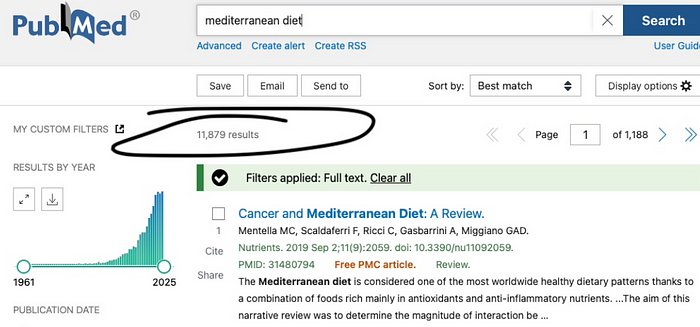
https://pubmed.ncbi.nlm.nih.gov/?term=mediterranean+diet&filter=simsearch3.fft
The choice is yours, but as a scientist and nutrition expert, here is what I recommend to my clients.
Whole grains
All the colors of the rainbow
Lean protein, plenty of seafood
Legumes daily (if you cannot tolerate these, I can help)
Healthy fats
Probiotic foods
Herbal teas and plenty of hydration
Daily movement
If there was a cheat code, we would all be selling it. Look at Ozempic, which I am in favor of with the right person (watch that muscle mass though)-it is available online via text message with a PA. No one is hiding the great hack to health. Small changes, done consistently, and living with intention (think before it goes in your mouth)- thats it.
You aren’t alone, and it’s not all in your head.
I am a registered dietitian helping women get to the root cause of diarrhea, constipation, and bloating so they can have predictable bowel movements.
Check out The Gut Restoration 6-module course
Schedule a free, 15-minute call here
@womensguthealth on YouTube, Instagram

Our Latest Articles

Dietitian’s Opinion of Carnivore/Low Carb Diets
The internet is WILD. Never in my life did I think I would see so many people believing that vegetables are toxic, and that meat is the only thing we should eat. My personal theory is that we are looking for hacks to make the daunting task of changing our habits feel easier, or faster-or we just aren’t motivated to change unless the change is sensational (think 75 hard instead of just working out consistently 3x/week and walking daily).
But the promises of these diets, Molly, you say to me. No more bloating, extreme weight loss, skin rashes clearing up, energy! How could it be bad?
Read on-we will break it down and explain why these things happen and if it is truly healthy.
What is a carb?
Yes-sugar, ultra processed foods, candy, baked goods are all carbohydrates. These specific products have virtiually no health benefits beside cheap calories, and calories do keep us alive.
But carbs are also fruit-containing water, fiber, antioxidants, vitamins, and minerals for optimal health. Potatoes, corn, green peas, whole grains, and legumes are also carbs. For reference, the American Heart Association recommends whole grains as one of the most effective ways to reduce cholesterol. Whole grains are also rich in minerals that aren’t found in other places. Legumes like chickpeas and black beans are just as rich in fiber as they are in protein, and recent research confirms that as little as 1/2 a cup per day can extend your life by seven years.
Plus, we need 150g, or 30% of a 2000 calorie diet, of carbs per day to allw our brain to function. Not eating that? Your body will make glucose from other sources until it gets annoyed and hits you with the most raging sugar cravings ever-you will give in and eat sugar. Then, you’ll get upset and frustrated at your lack of willpower and eat a pizza. I promise.
So why does low carb seem like the only way to lose weight?
Great question. Let’s say your normal day involves skipping breakfast because you are ‘fasting’ but you drink a 300 calorie matcha or oat milk latte (you are not fasting, check the nutrition label). Then, you get to the office and grab a scone from the front of the office and eat it mindlessly walking to your desk. A scone the size of your palm has 60g of carbohydrates. SIXTY. Then, you eat a salad with chicken for lunch (zero carbs) and your blood sugar crashes, you get exhausted, eat some candy from Trish’s desk, feel a little better, and get home to inevitably eat cheese while you cook dinner. For dinner, you make a stir fry with 3 tablespoons of teryaki sauce (30g more carbs just in the sauce)… you get it.
When you go ‘low carb’ what you are doing is forcing yourself to think before you put stuff in your mouth. Gone are the mindless scones and candy, the blood sugar rollercoaster, the high calorie dressings and sauces. Increased is your consumption of veggies and protein. OF COURSE you are going to lose weight!
Photo by Brooke Lark on Unsplash
What about Carnivore?
The carnivore diet works for IBS because it removes the fibers that feed your good gut bacteria but interact with your overgrowth (“bad”) bacteria and cause bloating, abdominal pain, and sometimes diarrhea or constipation. So yes, you will feel better at first. This is why low FODMAP works for a while also. Why does your skin clear up? Probably because you have a non celiac wheat sensitivity, and getting rid of gluten and related pesticides stops the trigger.
But if you don’t eat any fiber, you are not feeding your good gut bacteria! You are skyrocketing your risk of colon cancer. You are starving your body of antioxidants in fruit and veggies. AND, if you aren’t sourcing all of your meats locally, more than likely they are eating moldy feed which is causing adverse health effects in YOUR body.
I know carnivore seems like an easy fix, no more label reading, no worries about preservatives and pesticides but it WILL cause chronic disease over time, starting with high cholesterol. The sugar cravings I mentioned WILL happen.
Paul Saldinio, the (idiot?) who created this carnivore craze, quit the diet because he experience a plethora of negative health effects including lowered testosterone which is responsible for energy and muscle mass, among other things (gentlemen, ahem).
Vegetables are not toxic because they are grown in ‘toxic’ soil. There is not a lot of research on carnivore but you know what there is a shitload of research on? The Mediterranean diet for optimal health.

https://pubmed.ncbi.nlm.nih.gov/?term=mediterranean+diet&filter=simsearch3.fft
The choice is yours, but as a scientist and nutrition expert, here is what I recommend to my clients.
Whole grains
All the colors of the rainbow
Lean protein, plenty of seafood
Legumes daily (if you cannot tolerate these, I can help)
Healthy fats
Probiotic foods
Herbal teas and plenty of hydration
Daily movement
If there was a cheat code, we would all be selling it. Look at Ozempic, which I am in favor of with the right person (watch that muscle mass though)-it is available online via text message with a PA. No one is hiding the great hack to health. Small changes, done consistently, and living with intention (think before it goes in your mouth)- thats it.
You aren’t alone, and it’s not all in your head.
I am a registered dietitian helping women get to the root cause of diarrhea, constipation, and bloating so they can have predictable bowel movements.
Check out The Gut Restoration 6-module course
Schedule a free, 15-minute call here
@womensguthealth on YouTube, Instagram

Midlife changes in digestion, energy, and weight are automatic. Reclaiming your resilience is optional.
How do you want to spend the second half of your life?
What our Customers are Saying
Our clients share stories of relief, empowerment, and joy as they overcome gut health challenges through personalized nutrition plans, rediscovering the pleasure of eating without discomfort.
INTRODUCING THE
She's Got Guts- A Women's Gut Health Podcast
Where functional medicine and nutrition blend with ancient wisdom to bring you science-backed tips and practical insights for thriving in your wellness journey.
Hosted by Lara, an Eastern medicine practitioner and wellness wizard, and Molly, a gut health dietitian who keeps it real, this podcast tackles everything from bloating and hormones to the ups and downs of being a woman in today’s world (without having a menty B).
If you’re looking for science-backed advice, no-nonsense tips, and a little humor along the way, you’re in the right place. Tune in every week to take control of your gut health and feel good from the inside out.
New Episodes Drop Every Saturday on YouTube,
Apple and Spotify.
Frequently Asked Questions
What is a Registered Dietitian and how is that different from a nutritionist?
A Registered Dietitian is a healthcare professional who has completed related coursework (usually bachelor's and master's degree) and been credentialed by the Academy of Nutrition and Dietetics via a board certification exam and 1200 hour supervised practice internship.
This is different from a nutritionist, as RDN's must comply with federal regulations, be licensed at the state level, and adhere to a code of ethics. Anyone, including you, can call themselves a "nutritionist".
RDN's use evidence-based recommendations backed by scientific research and have completed years of schooling to understand the human body, digestion, and metabolism of nutrients so they may make the most practical and appropriate recommendations without bias or misinformation.
Do you take insurance?
We can provide you with a superbill that offers codes for reimbursement of an out of network provider. We also accept health savings/flex savings cards for payment.
Insurance companies are not based in prevention or longer, thorough work. Think back to your last doctors appointment, did the doctor spend a full hour with you? Could you email the doctor over the weekend and expect a response?
The reason our programs work is because we offer a detailed, thorough, personalized service-not 15 minute increments that result in a band-aid solution.
The reason you are reading this is because you have tried the other ways, and they have not worked for you. This is the BEST kind of investment, one that saves time and money in the long run (no more $80 supplement purchases that do nothing).
Plus, you aren't alone on this journey. Our concierge style service offers messaging and phone check-ins as needed. When was the last time your insurance paid for a phone call on a Saturday afternoon so you could review a restaurant menu for safe options before a night out?
Is this an extreme elimination diet?
NO! You have tried those! In order for you to be successful, the foods we decide to eliminate should:
Make you feel better right away.
Be reintroduced via step by step process within 3 months.
Allow for you to still have PLENTY of options of things to eat within your budget, prep time frame, level of competency in the kitchen, and preferences.
Most of our clients are eliminating too many foods already, so the first step is usually to bring some variety back and give you all the resources you need to meal plan, grocery shop, and prep like a pro using foods that love you back and ultimately support a healthy gut.
Where is your office located?
This is a remote practice, and all sessions are via Zoom or similar, depending on your preference. No commuting to an office, waiting in a waiting room, having to leave work or getting a babysitter. Meetings and your patient portal are encrypted and HIPPA secure.
What do you offer that I cannot do myself?
I understand it seems like we can just search the internet or support groups to find a solution without making an investment. But, haven’t you tried this strategy already? How did that work out?
We offer answers to those contradicting recommendations (fiber or no fiber?), provide accountability (this time you WILL succeed!), and all recommendations are based on your body.
What works for one person does not work for another, and there is no one pill to heal your gut. If this was true, your physician would have given you the secret sauce years ago!
How does this work?
The first step is to schedule a free, 15 minute consult with Molly.
During your call, she will also explain the different options of our programs based on your story and needs.
From there she can place you with the right fit (group, 1:1, pediatric, etc) for an initial session that lasts around 70 minutes.
What happens at my first session?
We review your entire health history & organize what to tackle in order of priority (for example if you have chronic kidney disease and chronic diarrhea but kidneys are fine right now, we wouldn't focus specifically on kidney health right away). We review what you are currently eating and what your schedule looks like, your medications and supplements, and all of your questions. After this session, you will have:
-A personalized action plan with tweaks to diet, lifestyle, and the supplements (if appropriate) you take to feel better right away.
-Answers to all your burning questions about YOUR condition and history.
-An idea of why you may be experiencing the symptoms and/or frustrations you are dealing with.
-A meal plan and general outline of foods that work/do not work for your body.
We always recommend before you make a decision on how to proceed that you attend the initial session, which is packed with value. Price varies based on practitioner/program, and we discuss pricing during your 15 minute consult.
Do you address mold, MCAS, eczema, and hormones?
YES! We have found that these are all related to gut issues. The gut is connected to every other body system, so to heal involves looking deeper into other areas of the body, past or present toxin exposures, and all the other things! Hormones like estrogen and insulin are always a factor as well, and we work to bring the body back to harmony.
How much is it?
We have tons of options to help you. From self-paced courses like The Gut Restoration to small groups to concierge style 1:1 nutrition therapy, each of these options comes at a different price point based on the level of expert service you receive. For any service that includes live sessions with Molly, current payment plans start around $200/month.
You can find Medical Nutrition Therapy all over the internet. We recommend investing in The Women's Gut Health Method only if you are serious about learning what your body needs and adjusting your current lifestyle, diet, and habits to a degree that works for you. Molly only works with women who want to ultimately experience the freedom to live life without worrying how your stomach will feel, optimize energy, and build a strong body and resilient nervous system. This takes more than a 1 hour session and our job is to light a fire under you to stop isolating and feeling like a victim of your current reality.
Over and over, we hear stories of women who have lost their spark, cannot eat at a restaurant with their partner, and are given an anti-depressant because this "must just be stress". You deserve better than that. You deserve to invest in yourself and your future to be playing with your grandchildren, confidently achieving goals, rocking clothes that make you feel HOT, and eating the foods you love at age 90 and beyond.
Do you work with men, non-binary, or transgender people?
Nutrition For People does not discriminate against race, gender, or sexual orientation. We are happy to hop on a call with any person and discuss how we can help or find a referral to a more experienced provider if we do not cover your particular issue within our areas of expertise. You will have the best results with our group offerings if you fall within the neighborhood of someone who has gastrointestinal distress and identifies as a female who will or has experienced menopause.


